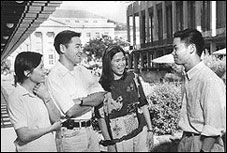![]()
![]()
![]()
![]()
![]()
![]()
Hindered From
Attending College in Their Native Vietnam, Four Siblings
Finish Their Education at UC
By D. Lyn Hunter,
Public Affairs
Posted October 6, 1999
|
|
|
Throughout their three years here, Huy, Chuong, Nghi and Thi Doan faced major difficulties including language and cultural barriers, financial hardships and caring for their critically ill mother.
"These students were at risk," said Jane Tupper, their adviser in the Department of Molecular & Cell Biology. "It is amazing to me that, in only three years here, they accomplished so much."
The siblings' journey began in 1992 when the Doan family left Vietnam, traveling halfway around the world to America. They left for the sole purpose of getting a college education for the children, an unattainable goal in their native land.
The father, Khoa Doan, a former officer with the South Vietnamese military, had been imprisoned for six years by the Communists. Because of prejudice against prisoners and their families, his children had trouble getting accepted to universities in Vietnam.
"It was important to my parents that we got a good education," said Huy, 28. "We could have stayed in Vietnam, but we would not have had the same opportunities."
Upon their arrival in Oakland, the four young adults enrolled at Laney Community College to fulfill general education requirements and learn English.
On a very tight budget, the family was only able to afford college through financial aid and with help from the siblings' older sister, who works in Sacramento.
In 1996, all four family members were accepted to Berkeley -- an extremely rare occurrence. Even more unusual, the junior transfers all chose the same major -- molecular and cell biology, one of the toughest disciplines on campus.
Accustomed to being top students in Vietnam, the Doans enrolled in too many units their first semester, and quickly were overwhelmed. They were too embarrassed to drop any classes, said Huy, since, in their culture, it would be an admission of failure.
They found help in Education 198, a class for older students who are new to campus. It is taught by Helen Johnson of the Re-entry Program, to help older and returning students adjust to campus life.
"They were ashamed about doing poorly in their classes," said Johnson. "It was a tremendous relief when they realized that dropping classes is a normal and acceptable practice for students here."
"We were in over our heads," said Huy. "But Helen talked to us about the necessity of cutting back, and this helped take away some of the shame we felt."
The Doans also had difficulty in the classroom because of language barriers and cultural differences.
"Because English is our second language, it took us a long time to read through the course material," said Chuong, 30. "Also, we are not accustomed to speaking directly with our professors; that relationship is much more formal in Vietnam."
Knowing the Doans had obstacles to overcome, Johnson took them under her wing, reassuring them that they had what it took to succeed.
"I am an immigrant myself and, like them, I did not have the opportunity to attend university until I came to America," she said. " The experience can be daunting."
To assist the Doans, Johnson created an informal network with Tupper, their adviser in the Department of Molecular & Cell Biology, and with advisers in the College of Letters & Science.
"This was crucial to the survival of these students," said Tupper. "Together, we helped them learn to navigate all the bureaucratic nuances, such as deadlines and scheduling options, and made them aware of the various resources available to them on campus."
"It was nice to be able to share common difficulties with other re-entry students," said Nghi, 26. "In addition to school, older students have families and children to worry about."
For the Doans, caring for their ill mother, who suffers from heart and kidney disease, was of utmost importance.
"We take her to the clinic three times a week for dialysis," said Nghi. "When she was hospitalized for nearly a month, we had to stay overnight to help comfort her and translate for the doctors and nurses."
The Doans juggled this duty with enormous amounts of studying. However, Johnson and the others encouraged the siblings to take time out to enjoy some extra-curricular activities.
"We joined the Vietnamese Students Club, and this gave us a chance to share stories and experiences with other natives who came to the United States," said Huy. "The group produced cultural programs, which helped us keep in touch with our roots."
Living with their parents while attending college was one Vietnamese tradition the Doans honored.
"Most kids in America leave home when they are 18," said Huy. "But in Vietnam, the family stays together through school and marriage."
The siblings plan to stay with their parents as long as
possible. Thi recently got a job with a biotechnology firm
in the area and Chuong is looking for employment in the same
field. Nghi hopes to be accepted to a local pharmacology
school. Huy is enrolled in a pre-med program at the
University of Vermont, but plans to move back to California
as soon as his education is completed.
![]()
![]()
October 6 - 12,
1999 (Volume 28, Number 9)
Copyright 1999, The Regents of the University of
California.
Produced and maintained by the Office
of Public Affairs
at UC
Berkeley.
Comments? E-mail berkeleyan@pa.urel.berkeley.edu.
